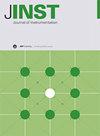R2D2 TPC: first Xenon results
IF 1.3
4区 工程技术
Q3 INSTRUMENTS & INSTRUMENTATION
引用次数: 0
Abstract
Abstract Radial time projection chambers (TPC), already employed in the search for rare phenomena such as light Dark Matter candidate, could provide a new detection approach for the search of neutrinoless double beta decay ( ββ 0 ν ). The assessment of the performances of such a detector for ββ 0 ν search is indeed the goal of the Rare Decays with Radial Detector (R2D2) R&D. Promising results operating a spherical TPC with argon up to 1 bar have been published in 2021. Supplementary measurements were recently taken extending the gas pressure range up to 3 bar. In addition, a comparison between two detector geometries, namely spherical (SPC for spherical proportional counter) and cylindrical (CPC for cylindrical proportional counter), was performed. Using a relatively simple gas purification system the CPC detector was also operated with xenon at 1 bar: an energy resolution of 1.4% full-width at half-maximum was achieved for drift distances up to 17 cm. Much lower resolution was observed with the SPC. These results are presented in this article.R2D2 TPC:第一个氙测试结果
径向时间投影室(TPC)已经被用于寻找轻暗物质候选等罕见现象,它可以为寻找中微子双衰变(ββ 0 ν)提供一种新的探测方法。评估这种探测器在ββ 0 ν搜索中的性能确实是R2D2稀有衰变探测器(R2D2) R&D的目标。在2021年发表了使用氩气高达1 bar的球形TPC的有希望的结果。最近进行了补充测量,将气体压力范围扩大到3bar。此外,还对两种探测器几何形状进行了比较,即球形(SPC为球形比例计数器)和圆柱形(CPC为圆柱形比例计数器)。使用相对简单的气体净化系统,CPC探测器也在1 bar的氙气下工作:在漂移距离达17 cm的情况下,半最大能量分辨率达到1.4%全宽。用SPC观察到的分辨率要低得多。本文介绍了这些结果。
本文章由计算机程序翻译,如有差异,请以英文原文为准。
求助全文
约1分钟内获得全文
求助全文
来源期刊

Journal of Instrumentation
工程技术-仪器仪表
CiteScore
2.40
自引率
15.40%
发文量
827
审稿时长
7.5 months
期刊介绍:
Journal of Instrumentation (JINST) covers major areas related to concepts and instrumentation in detector physics, accelerator science and associated experimental methods and techniques, theory, modelling and simulations. The main subject areas include.
-Accelerators: concepts, modelling, simulations and sources-
Instrumentation and hardware for accelerators: particles, synchrotron radiation, neutrons-
Detector physics: concepts, processes, methods, modelling and simulations-
Detectors, apparatus and methods for particle, astroparticle, nuclear, atomic, and molecular physics-
Instrumentation and methods for plasma research-
Methods and apparatus for astronomy and astrophysics-
Detectors, methods and apparatus for biomedical applications, life sciences and material research-
Instrumentation and techniques for medical imaging, diagnostics and therapy-
Instrumentation and techniques for dosimetry, monitoring and radiation damage-
Detectors, instrumentation and methods for non-destructive tests (NDT)-
Detector readout concepts, electronics and data acquisition methods-
Algorithms, software and data reduction methods-
Materials and associated technologies, etc.-
Engineering and technical issues.
JINST also includes a section dedicated to technical reports and instrumentation theses.
 求助内容:
求助内容: 应助结果提醒方式:
应助结果提醒方式:


